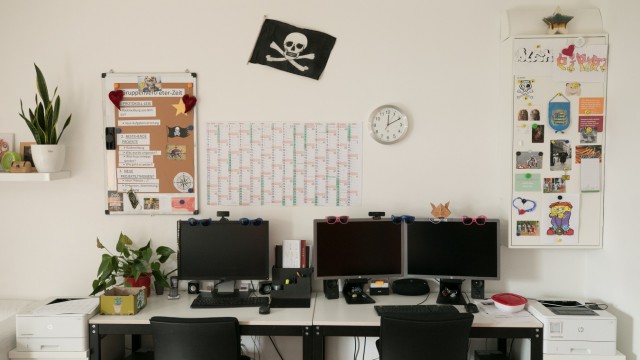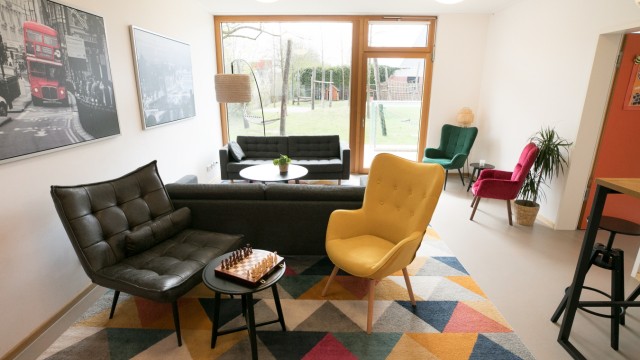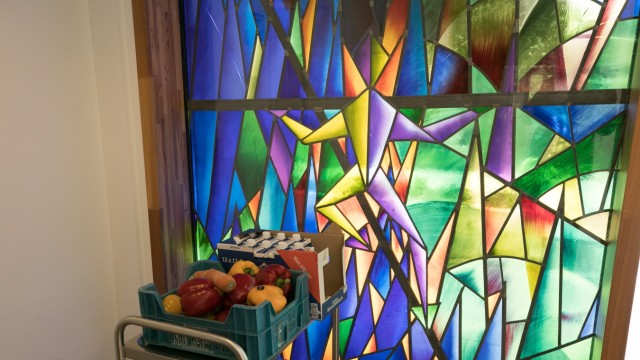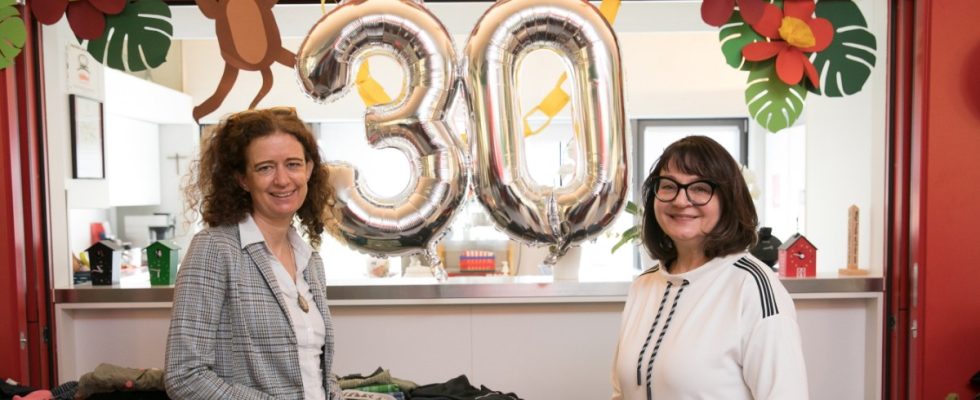It was the first job that Johanna Hofmeir took up as a young social worker after completing her studies, at a parish. There, on the square in front of the parish center in the north of Hasenbergl, children and young people hung around 30 years ago, for whom there was nothing but the street as a playground. Their unusual behavior did not make it into conventional childcare facilities. Her parents were overburdened with social problems. With the enthusiasm of youth, Johanna Hofmeir set out to set up afternoon care under difficult conditions, “not planned on the drawing board, but out of sheer necessity”. Her ambitious idea was to “close a gap in the social network.”
How big this gap actually was only became clear little by little. But that was perhaps also great luck, because it all seemed more feasible. “Lichtblick Hasenbergl” has now grown from its humble beginnings 30 years ago. With a family center, a children’s center and a youth center, the facility looks after around 200 children from birth to the age of 25 so that they find their place in life. Of course, there is no real age limit, “my children can come back whenever they need it,” says Hofmeir.
The fact that the 59-year-old still has the same enthusiasm as on the first day is probably due to the fact that she can count on an energetic team of 60 employees. Dörthe Friess, as educational director, is just as committed to fighting for the children and young people of Hasenbergl. Both are also driven by the success of their work, which is documented by their school, training and now also university degrees and which is more important to them than all the awards that Lichtblick has been able to collect.
The impact that role models can have can be seen when one of the young people says to a young woman after she has graduated from high school, “If she’s done that, then I can do it too.” It shows that the work of the “Lichtblick Hasenbergl” team has contributed to changing attitudes. When Lichtblick began sending children to secondary school, parents often reacted skeptically. The social department calls Hasenbergl-Nord a “region with the highest social challenges in Munich,” “characterized by a high proportion of burdened families in socially disadvantaged living situations.” There are far above average numbers of households with three or more children, and the proportion of children living in low-income households is almost twice as high as the city average.
Against this background, it is all the more impressive what Lichtblick creates: The successes – 57 percent of the graduates of the last nine years have jobs after completing training or studying, a further six percent are on parental leave and 17 percent are in training – have increased educational awareness District noticeably promoted. Parents, who predominantly work in the low-wage sector, mostly unskilled, and who were said to be lacking in education, are now concerned that their children pursue good career paths because they experience that their children have opportunities that were denied to them.
From the youth center you can see the children’s home. The kindergarten groups “Glühwürmchen” and “Schnuppenstern” as well as the after-school groups “Leselöwen” and “Schlaufüchse” for six to nine year olds are housed there.
(Photo: Florian Peljak)

“Lerntiger” and “Piraten” are the names of the two groups for ten to 13 year olds.
(Photo: Florian Peljak)

Computer workstations are available for young people.
(Photo: Florian Peljak)
In the parish, Hofmeir began developing a care concept for children from the street 30 years ago. Hofmeir calls them “little survivors.” The afternoon care followed a simple but effective approach: “We act like parents who look at what children need.” Johanna Hofmeir focused on care early on – a warm meal at lunchtime, then homework support and learning support. This included enough space to run around, as well as practicing the rules of living together and practical life training. In 1995, the Catholic Youth Welfare Department of the Archdiocese of Munich and Freising took over the unconventional facility, which eventually grew steadily and was housed at Wintersteinstrasse 35 before donations and foundations made the two new buildings for the children’s and youth center at Frauenholz behind the parish center possible.
Ray of hope Hasenbergl itself proved to be a constantly learning institution. Dörthe Friess, 51, joined the team after an SZ article and set up “Pro 10+”, a vocational training course that begins at the age of ten. Experience had shown that the children themselves were hardly in a position to express career aspirations: they simply lacked stimulating role models, their own parents or the parents of friends were unemployed or employed as unskilled workers. A number of Munich companies, including Dallmayr, offer the Lichtblick children an insight into the working and professional world through trial internships. This helps to reduce fears and find your strengths. Later, training support was added to prevent dropouts, which were often due to domestic stress.
Friess and Hofmeir are keen to open up “many opportunities” to children and help them to open up the world. “In the first few years we were really happy, if someone managed to qualify, then it was the secondary school leaving certificate,” says Hofmeir. Today around 50 percent of children make the jump to secondary school. And time and time again, some people succeed in graduating from high school, while some also fail. But that’s exactly what didn’t let Hofmeir and Friess rest: “We have to work on our ability to think and learn very early on.”
It has been shown that children’s development of thinking and learning abilities is “slowed down when they grow up in stressful circumstances.” In order to provide relief, Lichtblick also looks after the parents through the family center, helps to secure their livelihood, advises on all questions, and offers PC and German courses. The city council recently decided to expand the center because of its importance for families with small children.
If parents are worried, as they were during the pandemic, because they have lost their low-wage jobs, such as dishwashers or cleaners, or because inflation and energy prices are stretching their tight budget, then this does not go unnoticed by the children. “They don’t dare to ask for a new pen or whether they can go on an excursion,” says Hofmeir and emphasizes: “It also affects their ability to learn. You have to compensate for this with intensive, early support, otherwise things will come to nothing they don’t go through school.” Children must learn to listen and understand the essence of texts.

The youth center also offers a meeting place to “chill out”.
(Photo: Florian Peljak)

A window in the youth center was created based on the picture “Gratwanderer” by Ilse Erl. The artist made the construction of the house possible with a generous donation.
(Photo: Florian Peljak)
While all-day schools are often praised for creating equal opportunities, Lichtblick Hasenbergl’s experiences point in a different direction. “There are more and more all-day secondary schools,” says Dörthe Friess. “We only see the children in the evenings. They show a massive decline in their performance because there is no intensive support. We can no longer keep them there, it’s painful.” The all-day school does not offer a staffing ratio like that at Lichtblick, where one educational specialist looks after six children. “The current full day cannot replace a parent who cannot meet the school requirements,” says Hofmeir. “The attempt to create educational equality in this way deprives our children of the chance to graduate from school.”
Financing the comprehensive offering is not easy for Lichtblick Hasenbergl either, “even though the city and the Free State are giving us everything in terms of funding that is legally possible.” Around 40 percent of the budget therefore has to be raised through donations and third-party funds, around one million euros per year. For the next few years, Hofmeir has therefore decided to “create a financing concept that will help ensure our high level of quality in pedagogy.” But she also wants to ensure that the founding idea is “carved in stone”, to close a gap in the social network and to always focus on needs: “We do what is needed.” Simply a recipe for success.

